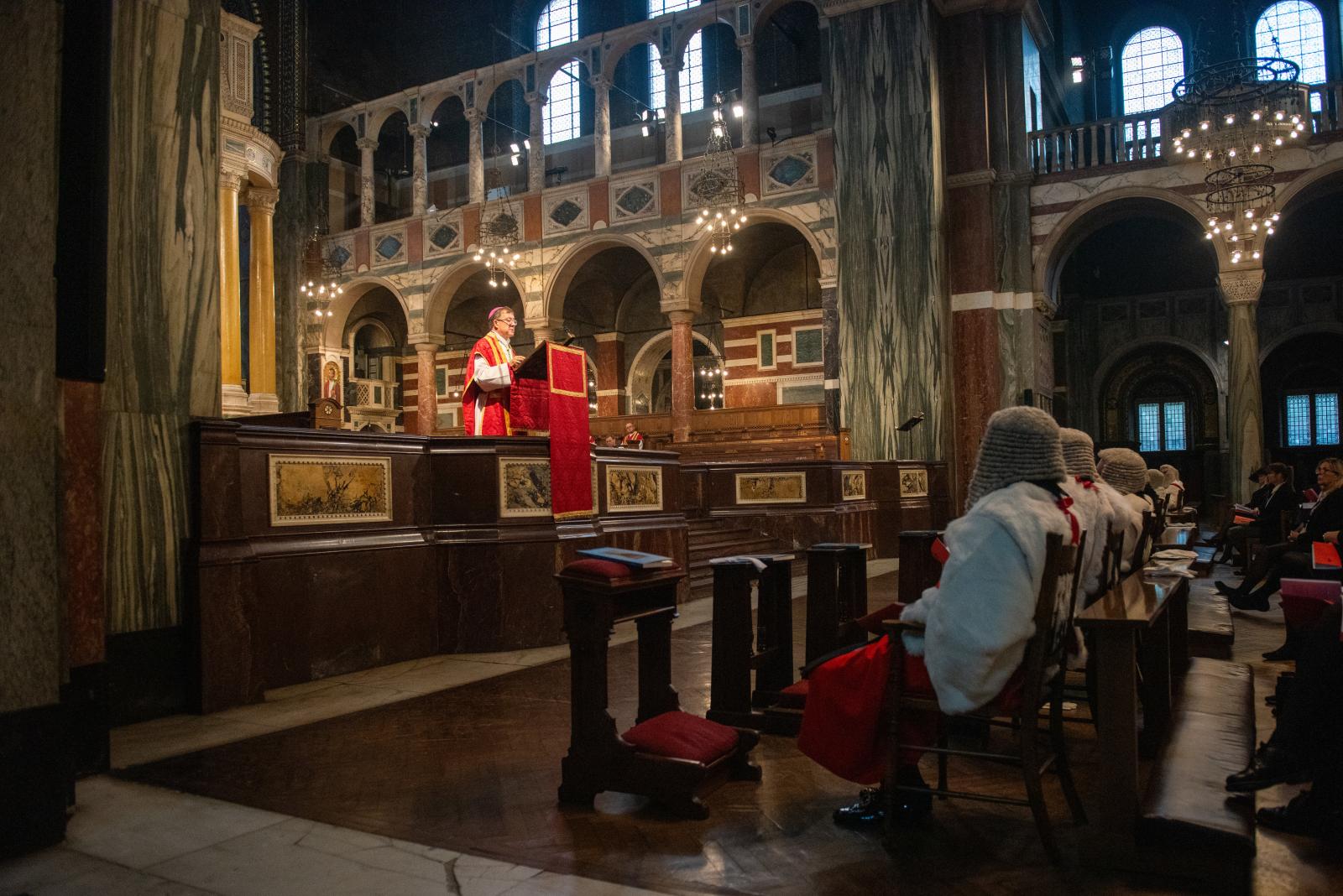Homily given at Westminster Cathedral on 2nd October 2023, at the Mass marking the start of the new legal year.
In May we celebrated the joyful coronation of King Charles III when he took the Oath to cause Law and Justice in Mercy. After his Coronation, he was presented with the Jewelled Sword, known as the Sword of Offering or the Sword of State. This sword, carried majestically by the Lord President, represented the three other swords on the altar; the Sword of Spiritual Justice signifying the Monarch as Defender of the Faith, the sharply pointed Sword of Temporal Justice signifying his judicial power and inscribed Iustitia et Pax, and the blunted tipped Sword of Mercy inscribed Misericordia Dei.
The Archbishop of Canterbury, holding the sword before the altar, prayed that the Lord would direct and support the King to use the sword as a minister of God to resist evil and defend the good, and presented it to him. The Archbishop continued: 'Receive this kingly Sword. May it be to you, and to all who witness these things, a sign and symbol not of judgement, but of justice; not of might, but of mercy…'
The sword was then clipped on the girdle of the king who sat down. The Archbishop of Canterbury gave the following injunction: 'With this sword do justice, stop the growth of iniquity, protect the holy Church of God and all people of goodwill, help and defend widows and orphans, restore the things that are gone to decay, maintain the things that are restored, punish and reform what is amiss, and confirm what is in good order: that doing these things you may be glorious in all virtue; and so faithfully serve our Lord Jesus Christ in this life, that you may reign for ever with him in the life which is to come. Amen.'
These words remind us your service to ‘cause Law and Justice in Mercy’, is not only the King’s work, but God’s work.
The first reading points to Christ, the innocent Suffering Servant, who brings forth true justice. He does not break the ‘crushed reed’ or quench the ‘the wavering flame’. In your service of the truth, after the analysis of evidence, the painstaking examination of the factors of a case, the presentation of arguments, and the desire for what is right, the Holy Spirit will guide you and lead you to temper justice with mercy.
On 21st August 2023, Pope Francis addressed lawyers from the Council of Europe and warned them against ‘a misguided notion of human nature and of the human person’, which ‘weakens their protection and gradually opens the door to grave abuses under the semblance of the good’. He reminded them that the foundation for justice is the dignity of each human person which is to be found in his or her transcendent origin. This forbids any violation of that dignity, while at the same time demanding, in all human affairs, respect for the centrality of the person, which otherwise is at the mercy of the whims and powers of the moment (cf. Address to the European Parliament, 25 November 2014). He warned them that if the transcendent dimension of life is lost, then there is the risk that a nation or continent slowly loses its own soul and that ‘humanistic spirit’ which it still loves and defends” (Ibid.). When the rule of law breaks down, we see the ‘demolition of man’ (to use words of Primo Levi).
Freedom of religion is an essential foundation for the flourishing of any society. The recent debate about whether silent prayer in particular contexts is a criminal offence is not new. After returning to his Catholic faith in 1584, St Philip Howard wrote to Cardinal Allen and asked how he could better serve the Catholic cause. He was advised that it would be safer to leave England and attempted to sail for Flanders. He was captured, tried, and convicted for writing to Cardinal Allen and attempting to leave the country without permission. He was fined £10,000 and imprisoned at the Queen’s pleasure.
In 1588, a second trial for treason followed with the charge of having prayed for the success of the Spanish Armada and the overthrow of the Queen. St Philip denied this charge but admitted to praying for the Catholic cause and the protection of Catholics. The witnesses for the prosecution said otherwise. He was tried by his peers in Westminster Hall. St Philip was already very ill, unskilled in trials, and had no representation before four of most formidable legal minds of the English Bar. He was found guilty and returned to the Tower. The Queen did not ever sign his death warrant and so he languished in the Tower and died in 1595. On the walls of his cell can be found the following words, 'Quanto plus afflictiones pro Christo in hoc saeculo, tanto plus gloriae cum Christo in futuro' ('The more affliction [we endure] for Christ in this world, the more glory [we shall obtain] with Christ in the next').
St Thomas More, ‘the King’s good servant but God’s first’, pray for us.
Bishop John Sherrington
